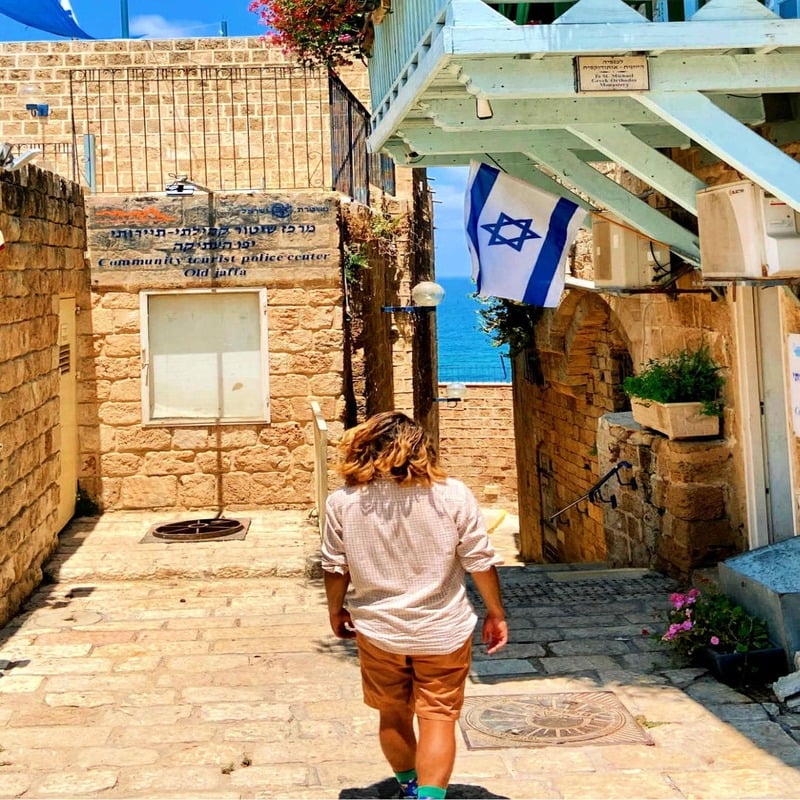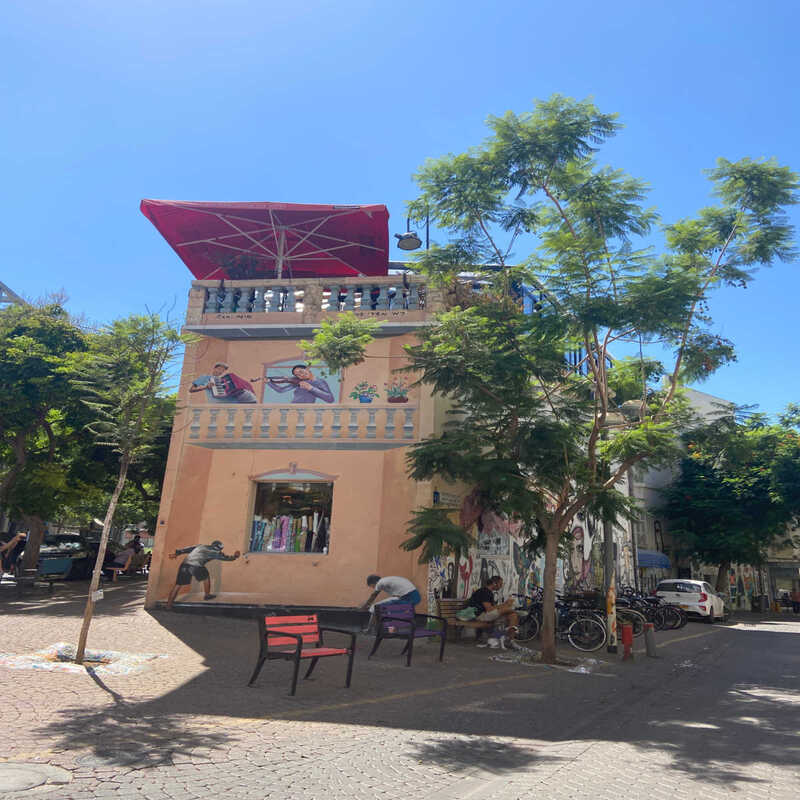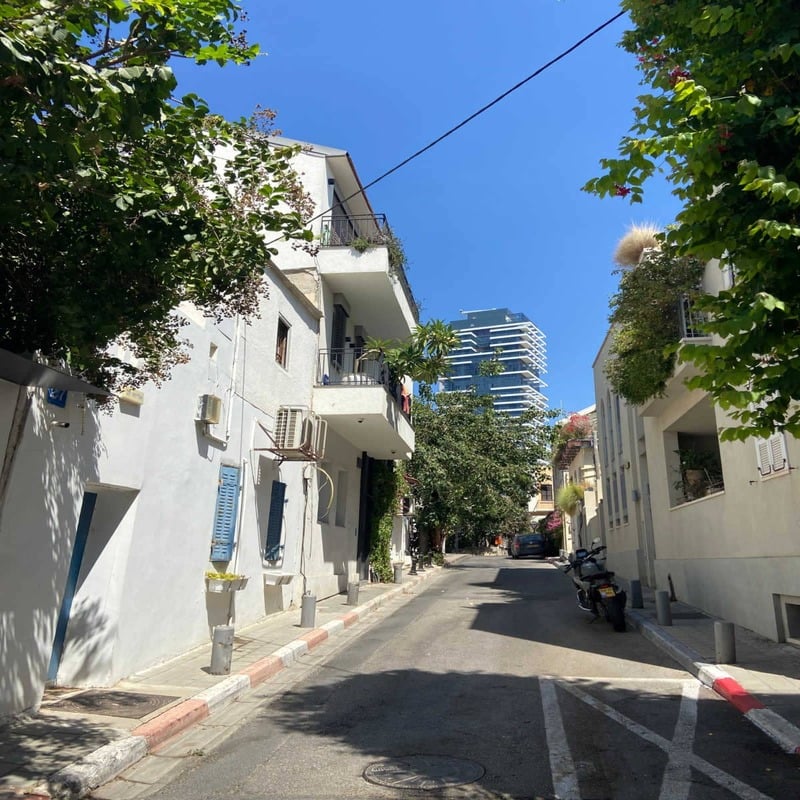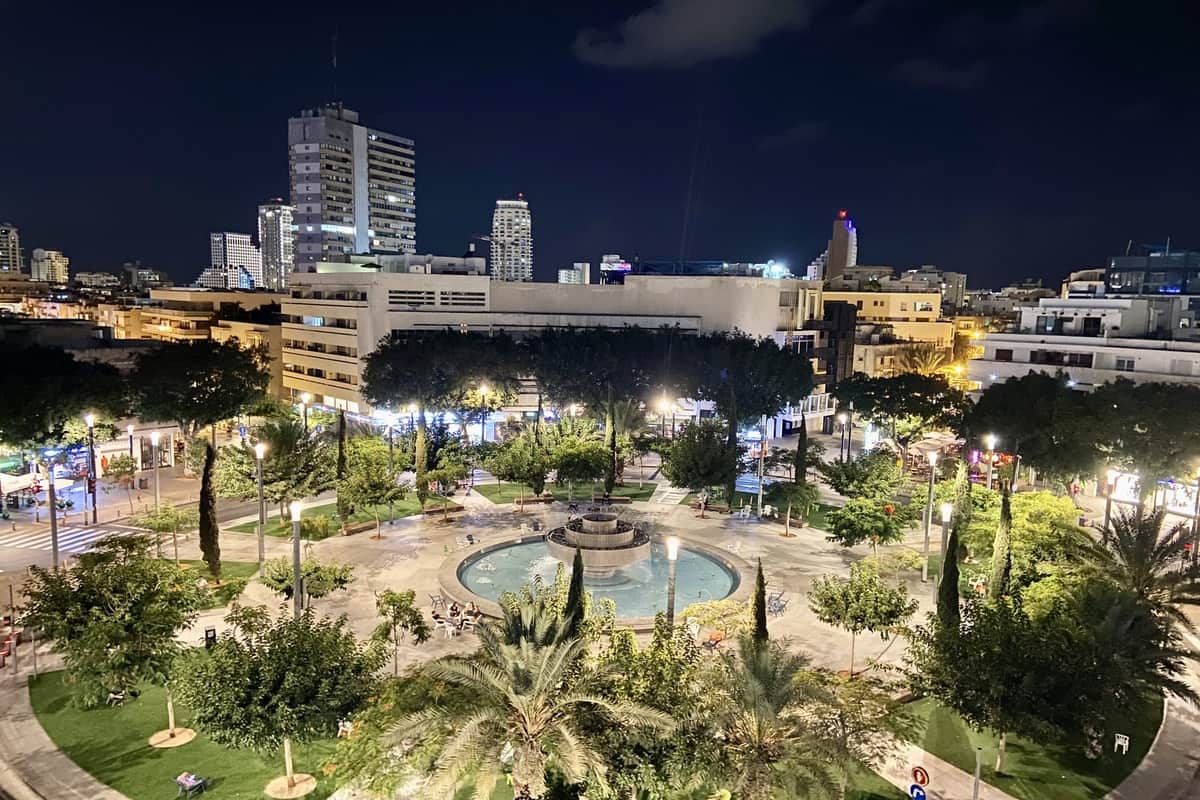We just spent a weekend in what’s arguably the most liberal and ‘free’ city in the Middle East, and the things we found and saw there were far more surprising – and dare we say, exciting – than we were expecting.
Writing for SuperboxTravel, I like to think of myself as a lover of freedom and advocate for an open world. After all, we have been covering the different levels of restrictions imposed on citizens over the course of the last two years and strongly supporting the resumption of normal tourism. As a traveler myself, I tend to favor destinations where individual liberties are upheld.
Not only when it comes to freedom of movement, but where people are not persecuted or criminalized based on their gender, sexuality, or political views, and that is safe in general for outsiders who don’t speak the language and/or are unfamiliar with the local customs.

Health crisis aside, I mostly avoided the Middle East in my years of traveling, not because it didn’t appeal to me – Iraq, for instance, is one of my bucket list destinations – but because it has developed a reputation for being a hotbed of religious quagmires and strict laws governing social life… Right?
As it turns out, that’s not always true, especially when it comes to this one compact metropolitan gem tucked away on the Eastern shores of the Mediterranean:
Not The Middle East I Expected

I’ll take a guess here, and please, do let me know if I’m wrong in the comment section. When you think ‘Israel’, the first image that pops to mind is probably that of ancient cities carved out of limestone, where both History and religion walk hand in hand, and the droves of pilgrims flock into every corner looking for some sort of religious awakening.
Am I wrong? Well, that’s not too far from the truth, as Israel is, indeed, the Land of the Bible, as well as home to places held as holy in all three major religions – Judaism, Islam, and Christianity. We all know it can be an incredible destination for believers, irrespective of the Abrahamic branch they belong to, but what about others?

Others like me, who are thrill-seeking young digital nomads who do not feel strongly about any particular religion and who wouldn’t necessarily mind the occasional infusion of History, are simply hoping to have a cracking time for once. Luckily for both demographics, Israel has the best of both worlds: sites of huge historical importance and unparalleled city breaks.
Of course, it is the birthplace of Jesus, John the Baptist, King Herod, and all other Bible icons that have been in our social imagery since children for many of us, whether we were born into a Christian household or simply hail from the Christianized Western World. But then again, it is home to Tel Aviv, which is the most overlooked city I’ve ever set foot in.
What Makes Tel Aviv Great?
In a country as packed with millennia-old monuments and wild nature as Israel is, Tel Aviv is a city that looks almost out of place. Its monumental skyscrapers cannot be found anywhere else, and the unblemished white of its signature Bauhaus architecture looks strikingly alien in a country where the ocher-tinged tone of its historical buildings is the commanding color.
Tel Aviv is an aberration, and although some of the Orthodox Jews of Israel would certainly like to keep it in line with the more-conservative Jerusalem and Nazareth, I mean it as a compliment of the highest order. This is the Land of Creation’s younger, rebellious child, who owes its charming looks to a century of innovation and openness to the outside world.

It couldn’t have been any different: it was established on the shores of Israel’s central Mediterranean Coast in the early 20th century, and throughout the decades that followed, it hosted an influx of migration from the Americas, Europe, and other Middle Eastern neighbors, as far southwest as the continent of Africa.
This amalgamation of cultures, customs, languages, and ethnicity is still very much present in Tel Aviv. It is indisputably a city belonging to the Jewish State at its core, but if you’re looking for Israel’s equivalent to a multi-faith international community and/or more permissive branches of Judaism, then here is where you’ll find them.

Being a gay man holding what I would like to consider a ‘progressive’ worldview, I felt at ease in Tel Aviv as I would normally in Amsterdam, Stockholm, or Lisbon. Granted, I can’t speak for other groups, and certainly not for women, but even then, I was under the impression tourists from all walks of life would feel just as embraced and welcome as I was.
In fact, finding the odd rainbow flag proudly displayed on a private balcony or a shop’s front door isn’t a strange sight in Tel Aviv. In the wider Middle East, where numerous countries still criminalize same-sex relationships or even expect women to live under certain constraints, this is certainly a testament to its status as a young, free city.
Top Things To Do In A Weekend In Tel Aviv

Tel Aviv may look imposing in pictures when it excels at mimicking New York City’s skyscraper-dotted skyline, but in reality, it is a small town with big city aspirations. By that, I mean it is incredibly compact, in spite of its metropolitan feel, and getting from one end to the other will not take you longer than 35-40 minutes of driving (if there’s traffic).
This is why it is such a perfect weekend getaway: most of the attractions are all clumped together and can be seen in a single day. Below, I have listed six of my favorite things to do while on a weekend in Tel Aviv:
6. Swim At One Of The City’s Beaches
You’re free to be yourself in Israel.
Many Americans may not be entirely aware of this, but Israel straddles Western Asia’s Mediterranean shore. In other words, the world’s most sought-after beach destination, where Ibiza, Santorini, Cyprus, and the like are located, incorporates Israel to an extent – and like any Mediterranean hub, Tel Aviv’s access to the sea makes it a popular swimming hotspot.
I’m not even one for beach hopping myself, but I certainly couldn’t resist relaxing at a Hilton Beach lounge on a scorching mid-September afternoon, fresh-squeezed lemonade and Kindle at hand, hearing the sound of waves crashing and the faint hint of pop music coming from the nearest beach bar. Absolute heaven.
It is also known for being the ‘gay beach’ of Tel Aviv, though judging by its diverse crowd of young bathers, it is popular among all groups. However, if you’re coming with your family and would prefer a more child-friendly spot, I can suggest Gorden Beach instead, located directly opposite the Sheraton Hotel, or even Geula Beach.
5. Go For A Bite To Eat At Carmel Market

Around 50 – 66 NIS (≈ $14 – $19 USD) for a one-course meal
I’m not the biggest fan of street markets myself. I have little use for the trinkets and souvenirs shouting vendors try to sell you at any cost, nor do I particularly enjoy being hurried along amid the current of tourists and other curious onlookers exercising their bargaining skills. For that reason, I wasn’t truly looking forward to visiting the open-air Carmel Market.
It was, however, part of my Tel Aviv Weekend Tour itinerary, and as soon as we approached the first row of shops stacked with Persian rugs, art pieces looking meticulously made, and the smell of kebab grilling on skewers, I knew I was in for a treat, and couldn’t have been more grateful to my guide, Michael Skir, for insisting we came here.
Carmel Market couldn’t be farther from your usual tourist trap, with all its colorful flowers – irises, gladiolas, and roses that owe their blood-red vibrancy to a prosperous Mediterranean climate – dried fruits, dates, and other Western Asia classics, as well as a plethora of unique condiments I would have loved to take home myself, were I not a dreadful cook.
Moreover, it is one of the best lunch spots in all of Tel Aviv: its corridors are home to various restaurants and street food stalls, and I certainly felt spoiled for choice in picking a favorite. If your heart is set on traditional Middle Eastern cuisine – especially if you’re hoping to sample some humus – then this is the place to be.
Pro tip? You don’t want to miss the Hummus Shlomo & Doron Restaurant*.
*Nakhalil’el St, 24, Tel Aviv-Yafo
4. Immerse Yourself In History At The ANU Museum

Perhaps the farthest out of the five – that is, if you’re staying central – Tel Aviv University’s ANU Museum was bound to become one of my highlights for a very simple reason: my favorite pastime is cuddling up to my cat, burying my nose in a book, and spend hours on end ruffling through the pages lost in thought.
A museum chronicling the trajectory of Israel as an ideal and then a nation, over time, ANU felt very much like a giant-sized book full of textures and vibrant imagery I could just walk into. Similarly to the Museum of Contemporary History in Bonn, Germany, still my all-time favorite, each floor of ANU is dedicated to a particular period of Jewish History.
Slowly working your way down from the top floor, you will learn how ethnically diverse and surprisingly multicultural the Jewish peoples are, what has been their collective angst and goal across centuries, who are some of the brightest minds to have been born in Israel, and how far this relatively new country has come in as little as seven decades.
My only regret? Not having planned longer than an hour here.
3. Downtown Is Where It’s At

Tel Aviv may not be the ideal destination for those fixated on deep cultural expeditions, but it does shine through with its extensive list of world-renowned restaurants, some of which I will detail further down, bohemian districts where youngsters pour into the streets for a much-needed weekend relief, and a cafe culture rivaling that of Europe.
The best place to feel the atmosphere and mingle with locals and visitors alike is the Downtown Area, close to the iconic Rothschild Avenue and any of the smaller streets feeding into it, such as Allenby, Florentin, and Levontin. Here, you will find alfresco dining options, quirky themed cafes waiting to go viral on TikTok, the country’s top-rated nightclubs, and even co-working spaces perfect for digital nomads.
Being completely unaware of Tel Aviv’s hidden wonders until I landed, I could have easily skipped the 20th-century city altogether and headed straight to the nearest Roman-era citadel. Sky-high apartment blocks, busy city life, and shopping centers are not exactly my cuppa, but now, I’m so glad that I didn’t.
It’s precisely this eccentricity and the city’s unique status as a modernized financial center in the heart of the primeval nation, whose existence has been enshrined on the pages of the world’s best-selling book, that make it worthwhile, even if only for a long weekend.
2. The White City

Besides being home to Israel’s liveliest social scene, Tel Aviv is a guidebook for minimalist aesthetics. An experimental ground for Bauhaus, a 1919 creation of German architect Walter Gropius, Tel Aviv’s historical center is home to a vast collection of whitewashed, UNESCO-listed monuments comprising the so-called ‘White City’.
Strolling the area, tourists are graced with views of rectangular-like or round structures without intricate decorations or the ornate, romantic forms you’ll find in Europe’s Belle epoque buildings. Tel Aviv’s oldest neighborhood, which defies other contemporary developments, is both a lesson in architectural practicality and a sight to behold.
These geometric shapes are spread across the city center, and they’re surely not hard to find, but for some of the most iconic sights, I strongly suggest you visit Rothschild Boulevard, Tel Aviv”s pulsating vena cava, adorned with some of Gropius’ finest feats, and Dizengoff Square, the setting for a futuristic water fountain display flanked by Bauhaus landmarks.
1. The Ancient Jaffa

My favorite district in all of Tel Aviv, Jaffa is an ancient port dating back thousands of years that was slowly absorbed by the city as it grew larger, rising from a mere 34,000 inhabitants in 1920 to over 400,000 today. Luckily, its strong identity as a distinct entity hasn’t entirely vanished, in spite of the contrasting 21st-century skyline surrounding it.
As soon as you cross the former municipality’s symbolic threshold, which proudly reads ‘Welcome to Old Jaffa’, you will feel like stepping back in time and into an alternate reality where Tel Aviv’s modern sea promenade and a cluster of skyscrapers give way to narrow alleyways, lined with little craft shops, museums, and centuries-old churches.
Doubtless, Jaffa is the most Instagrammable district in Tel Aviv, and in short walking distance of the White City, it makes for an incredible day trip away from all the hustle and bustle. Once in Jaffa, make sure you check out:
- Jaffa Port
- Ilana Goor Museum
- The Flea Market
- The ‘Suspended Orange Tree’
- The Frank Meisler Gallery
- The Great Mahmoudiya Mosque
- St Peter’s Church
- The House of Simon the Tanner
Tel Aviv Should Be Every Foodie’s Dream Destination
Out of the 40 countries I have visited so far, and more than 200 cities globally, I must confess Tel Aviv would rank somewhere in my top 5 for foodie destinations. Whether it’s sizzling shoarmas straight from the market, or fine dining overlooking the Mediterranean coast, travelers are for sure in for a treat, irrespective of budget.

Compiling the list below was a tough pick, but I did try my very best:
- Puaa, a mid-range cafe and restaurant located in the heart of Old Jaffa’s flea market, is known for its variety of hummus, cheese, and Mediterranean dishes (I cannot recommend their Balkan-style moussaka highly enough);
- ARIA, features a downstairs bar and lounge and a cozy upstairs restaurant with views of Downtown Tel Aviv. Their Arab-style mains are beautiful, especially the Persian kebab with fresh vegetables and tahini;
- Manta Ray is a beach-side restaurant known the world over for its comprehensive seafood menu and the assortment of Meze that accompany it, ranging from Mediterranean salads to Balkan bread and everything in between.
As a devoted foodie myself, and an enthusiast of SuperboxTravel, I couldn’t help but verge off the main route and explore a side of Tel Aviv most tourists are completely unaware exists. Luckily, my guide Michael knew just where to go to quench my thirst for authentic experiences, and thanks to him, I met one of Israel’s most renowned cooks, Myassar Seri.
Mrs. Seri is an Israeli citizen of Palestinian origin who leads cooking workshops from her own home, nestled in Jaffa, and who has done an awe-inspiring job at bridging gaps between Israelis, regardless of their religion or political inclinations, and sharing her culture with other men and women who are willing to learn it.
Amid the ongoing Arab-Israeli conflict, witnessing this woman’s willingness to heal old wounds, and express her own family history through a rich, flavorful Arab cuisine that’s been passed along generations upon generations, is an experience I will cherish forever, and one I can only encourage other visitors to undertake.
As you’ve been made aware already, I may be a terrible cook myself, and I am sure I wasn’t of much help in my group, but in spite of my clumsiness and ceaseless efforts to spoil the tahini – one of my main tasks that day – it still turned out to be one of tastiest entrées I’ve had in my life.
Either I’m not nearly as bad in the kitchen as I thought I was, or Mrs. Seri’s miracle-working hands somehow saved the day.
I’m banking on the latter.
It Was A Movie…

If you’re flying all the way from America to Israel and you’re planning on spending a weekend in Tel Aviv, like me, I would first advise you to steer clear of shady AirBnB owners and stay in the White City area, arguably a prime location for short-term visitors, within walking distance to all the major shopping centers, street markets and the Port of Jaffa.
I will go even further and personally recommend Esther Cinema, my own hotel. A true Bauhaus jewel towering over Dizengoff Square, one of the main landmarks I mentioned earlier, this hotel has a life of its own. Not only was it once one of Tel Aviv’s first cinemas, it boasts incredible views of the White City below and a sumptuous breakfast spread.

Today, other than the vintage film posters hanging from the walls and the enviable display of movie projectors dating back to the 1950s, there is little left of Esther Cinema on site to indicate that this hotel, part of Atlas’ Boutique portfolio, was ever designed to welcome passionate moviegoers, but you will still find:
- It is remarkably stylish, with an interior that pays homage to the decayed magic of Hollywood
- Breakfast is included, with a wide array of salads, pastries, and even hot dishes that kept me full until the early evenings
- The hotel hosts a happy hour with complimentary refreshments, other tidbits, and live music
- Amid the current hotel fare surge in other beach destinations, Cinema Hotel’s are still relatively affordable*
*The price for a Twin Room is an estimated USD 188.00 per night on Superboxtravel.com
How To Get To Tel Aviv
Direct flights to Ben Gurion International, Israel’s main entry hub serving both Tel Aviv and Jerusalem, are available from:
- Boston (EL AL Israel Airlines)
- Chicago O’Hare (United Airlines)
- Las Vegas (EL AL Israel Airlines)
- Miami (American Airlines + EL AL Israel Airlines)
- New York-JFK (American Airlines + EL AL Israel Airlines)
- New York-Newark (EL AL Israel Airlines + United Airlines)
- San Francisco (EL AL Israel Airlines + United Airlines)
- Washington-Dulles (United Airlines)
I’d advise you to check airfares with each airline for flight deals and competitive prices – as we have seen this year, they might have been hiked as a result of the soaring inflation. On the bright side, those looking for a last-minute deal for their fall vacays will be thrilled to learn this off-season has been the best time to book international flights globally.
Can I Travel To Israel If I’m Unvaccinated?
Earlier this year, Israel removed all health entry requirements for foreign visitors, including U.S. citizens arriving from the United States. Heading into the fall, all of the following apply:
- No vaccination certificates are required, including boosters
- No pre-departure testing, even for the unvaccinated
- No post-arrival testing
- No post-arrival quarantine at a government-listed facility
- No mandatory masks in any public settings
Despite the relaxation of measures, tourists must still complete a Passenger Locator Form up to 48 hours prior to departure.
So yes, Tel Aviv – and, to an extent, the astoundingly beautiful country of Israel – is open for tourism and looking forward to having you back. For unique experiences and a customized itinerary based on your own profile as a traveler, get in touch with the knowledgeable Michael Skir, who was my own contact on the ground while in Israel.
Without Mr. Skir’s expertise, insightful comments, and love for Israel, it would have been much more challenging to peel off all these layers of Tel Aviv I didn’t even know existed.

